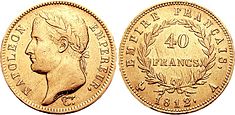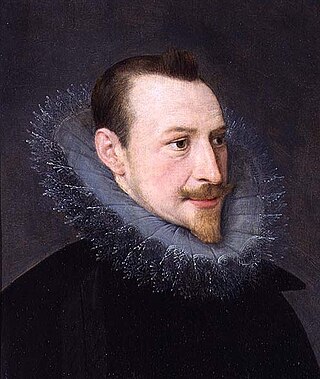
Edmund Spenser was an English poet best known for The Faerie Queene, an epic poem and fantastical allegory celebrating the Tudor dynasty and Elizabeth I. He is recognized as one of the premier craftsmen of nascent Modern English verse, and he is considered one of the great poets in the English language.

William Wordsworth was an English Romantic poet who, with Samuel Taylor Coleridge, helped to launch the Romantic Age in English literature with their joint publication Lyrical Ballads (1798).

Benjamin Jonson was an English playwright and poet. Jonson's artistry exerted a lasting influence on English poetry and stage comedy. He popularised the comedy of humours; he is best known for the satirical plays Every Man in His Humour (1598), Volpone, or The Fox, The Alchemist (1610) and Bartholomew Fair (1614) and for his lyric and epigrammatic poetry. He is regarded as "the second most important English dramatist, after William Shakespeare, during the reign of James I."
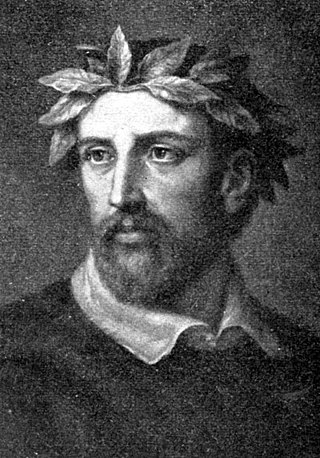
A poet laureate is a poet officially appointed by a government or conferring institution, typically expected to compose poems for special events and occasions. Albertino Mussato of Padua and Francesco Petrarca (Petrarch) of Arezzo were the first to be crowned poets laureate after the classical age, respectively in 1315 and 1342. In Britain, the term dates from the appointment of Bernard André by Henry VII of England. The royal office of Poet Laureate in England dates from the appointment of John Dryden in 1668.
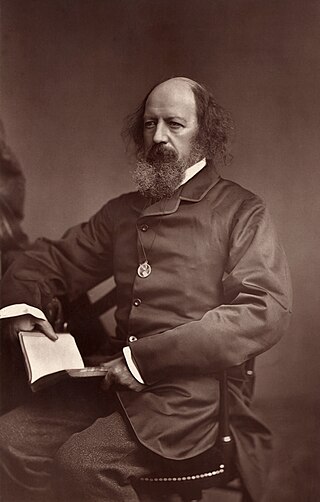
Alfred Tennyson, 1st Baron Tennyson,, was an English poet. He was the Poet Laureate during much of Queen Victoria's reign. In 1829, Tennyson was awarded the Chancellor's Gold Medal at Cambridge for one of his first pieces, "Timbuktu". He published his first solo collection of poems, Poems, Chiefly Lyrical, in 1830. "Claribel" and "Mariana", which remain some of Tennyson's most celebrated poems, were included in this volume. Although described by some critics as overly sentimental, his poems ultimately proved popular and brought Tennyson to the attention of well-known writers of the day, including Samuel Taylor Coleridge. Tennyson's early poetry, with its medievalism and powerful visual imagery, was a major influence on the Pre-Raphaelite Brotherhood.

Robert Southey was an English poet of the Romantic school, and Poet Laureate from 1813 until his death. Like the other Lake Poets, William Wordsworth and Samuel Taylor Coleridge, Southey began as a radical but became steadily more conservative as he gained respect for Britain and its institutions. Other romantics such as Byron accused him of siding with the establishment for money and status. He is remembered especially for the poem "After Blenheim" and the original version of "Goldilocks and the Three Bears".
The Spenserian stanza is a fixed verse form invented by Edmund Spenser for his epic poem The Faerie Queene (1590–96). Each stanza contains nine lines in total: eight lines in iambic pentameter followed by a single 'alexandrine' line in iambic hexameter. The rhyme scheme of these lines is ABABBCBCC.

Sir William Davenant, also spelled D'Avenant, was an English poet and playwright. Along with Thomas Killigrew, Davenant was one of the rare figures in English Renaissance theatre whose career spanned both the Caroline and Restoration eras and who was active both before and after the English Civil War and during the Interregnum.
This article lists notable literary events and publications in 1599.

The Golden Treasury of English Songs and Lyrics is a popular anthology of English poetry, originally selected for publication by Francis Turner Palgrave in 1861. It was considerably revised, with input from Tennyson, about three decades later. Palgrave excluded all poems by poets then still alive.

Poets' Corner is a section of the southern transept of Westminster Abbey in London, where many poets, playwrights, and writers are buried or commemorated.
The Oxford Book of English Verse, 1250–1900 is an anthology of English poetry, edited by Arthur Quiller-Couch, that had a very substantial influence on popular taste and perception of poetry for at least a generation. It was published by Oxford University Press in 1900; in its india-paper form it was carried widely around the British Empire and in war as a 'knapsack book'. It sold close to 500,000 copies in its first edition. In 1939, the editor revised it, deleting several poems that he regretted including and adding instead many poems published before 1901 as well as poems published up to 1918. The second edition is now available online.
The Oxford University Press published a long series of poetry anthologies, dealing in particular with British poetry but not restricted to it, after the success of the Oxford Book of English Verse (1900). The Oxford poetry anthologies are traditionally seen as 'establishment' in attitude, and routinely therefore are subjects of discussion and contention. They have been edited both by well-known poets and by distinguished academics. In the limited perspective of canon-formation, they have mostly been retrospective and well-researched, rather than breaking fresh ground.
Several anthologies of religious poetry have been published by Oxford University Press.

Gondibert is an epic poem by William Davenant. In it he attempts to combine the five-act structure of English Renaissance drama with the Homeric and Virgilian epic literary tradition. Davenant also sought to incorporate modern philosophical theories about government and passion, based primarily in the work of Thomas Hobbes, to whom Davenant sent drafts of the poem for review.
The Library Edition of the British Poets was the title given to a 48-volume edition of the works of British poets, published between 1853 and 1860 by James Nichol of Edinburgh, edited, with lives of the authors, critical dissertations and explanatory notes, by the Rev. George Gilfillan. All the poets included were dead by the date of publication, and nearly all were born before 1770. The English Romantic poets were thus omitted from the collection.
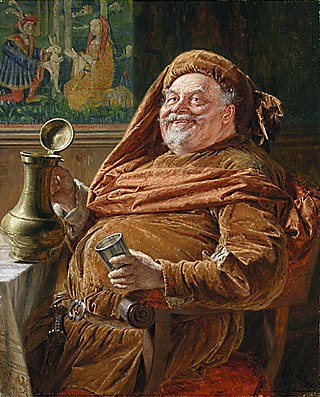
Sack is an antiquated wine term referring to white fortified wine imported from mainland Spain or the Canary Islands. There was sack of different origins such as:

The British Poet Laureate is an honorary position appointed by the monarch of the United Kingdom, currently on the advice of the prime minister. The role does not entail any specific duties, but there is an expectation that the holder will write verse for significant national occasions. The origins of the laureateship date back to 1616 when a pension was provided to Ben Jonson, but the first official holder of the position was John Dryden, appointed in 1668 by Charles II. On the death of Alfred, Lord Tennyson, who held the post between November 1850 and October 1892, there was a break of four years as a mark of respect; Tennyson's laureate poems "Ode on the Death of the Duke of Wellington" and "The Charge of the Light Brigade" were particularly cherished by the Victorian public. Four poets, Thomas Gray, Samuel Rogers, Walter Scott and Philip Larkin turned down the laureateship. Historically appointed for an unfixed term and typically held for life, since 1999 the position has been for a term of ten years. The holder of the position as at 2024 is Simon Armitage who succeeded Carol Ann Duffy in May 2019 after 10 years in office.
John Kay was a fifteenth-century English poet who described himself as the versificator regis to Edward IV of England. If it ever existed, none of his poetic work remains.
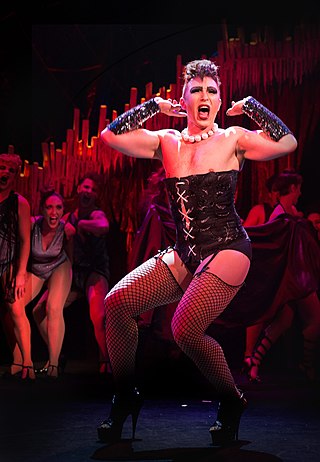
D'Arcy Drollinger is an American actor, writer, musician, director, producer & choreographer known for his high-camp / vaudeville-style stage productions and films that combine slapstick, farce and often drag. He was a founding member of the post-punk art band Enrique. He is the owner of the San Francisco nightclub Oasis. Drollinger is also the creator of the dance-fitness brand, Sexitude. D'Arcy was appointed the San Francisco Drag Laureate in 2023.

